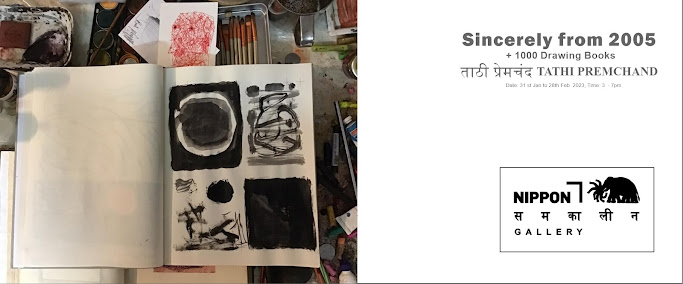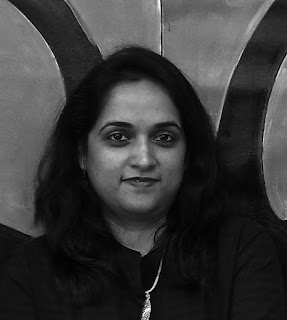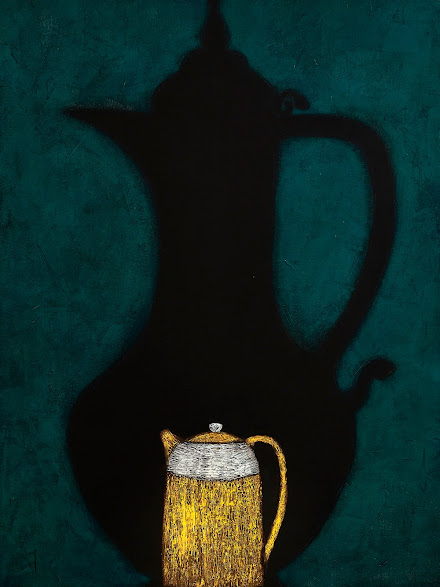Smita Kinkale, a celebrated and fable artist especially known for her textured artworks made out of recycled and treated Polymer is being showcased at Tao Art Gallery’s “Unstructured Pursuit Of Perspectives” as a part of the Mumbai Gallery Weekend 2023.
 |
| Artist: Smita Kinkale |
Her works are a combination of layers of material, thoughts and experimentation. Conveyed forward by a creative mind and the investigation of the notions from her childhood, these artworks are a juxtaposition between abstraction and figurative demonstrations.
This exhibition pictures the artist’s perspectives of visualising the world around and analogy of matters in nature with humans. It creates an ‘unstructured’ experience through art and creativity and makes the viewers consciously sensitive. The combination of lines, dots and primitive shapes created through the layers of polyethene delineate her growing up in rural communities and tribal roots.
The spontaneous actions that are a result of subconscious reactions reproduce dreams of space, infinite secrets and potential outcomes of another new world.
Completed her art education from Sir JJ School of Fine- 1999, Art and the artist lives and works in Mumbai.Smita Kinkale participated in many national and international solo and group exhibitions with Private collection of her painting around the world -
- Text by Sanchita Sharma
New Delhi - Artblogazine
Tao Art Gallery presents works by Smita Kinkale & Rajesh Wankhade under exhibition
"Unstructured Pursuit Of Perspectives” as a part of the Mumbai Gallery Weekend 2023
•A two-man show by artists Rajesh Wankhade & Smita Kinkale, curated by Sanjana Shah •'Unstructured Pursuit of Perspectives' is an amalgamation of different perspectives, where both artists make an 'un-structuring' happen through their art to create parallels of perspective in the mind of the viewer•The end goal is to show the unified state of all, stripping away the existing rigid narratives around the uses of matter and roles of humanity•The works by both artists are layered by not just materiality but also in thought, challenging notions of time and space, presence and absence. •The show opens as a part of the four day preview at the 11th edition of MGW ( January 12- 15) and will continue until January 31, 2023 •As a part of the opening weekend, the gallery will also be hosting the Staatskapelle Berlin to perform a set of string quartet. It will be an evening wherein Art meets Music!
 |
Tao Art Gallery : Sanjana Shah |
Mumbai, December 27, 2022: TAO Art Gallery in collaboration with HIMS Academy, Germany will host a unique show called "Unstructured Pursuit of Perspectives" for the 11th edition of MGW. Curated by Sanjana Shah, the exhibition will showcase artworks by upcoming contemporary artists Rajesh Wankhade & Smita Kinkale. The show opens as a part of the four-day preview at MGW 2023 - scheduled from January 12- 15, 2023 and will be on display till January 31, 2023.
A prominent part of Mumbai's contemporary art scene and MGW roster - Tao's latest show highlights the fundamental human pursuit of revelation. Both artis make an 'un-structuring' happen through their art to create perspective parallels in the viewer's mind.
In the spirit of celebrating diverse forms of art, the gallery will be hosting Tilia-Quartet of Staatskapelle Berlin on Saturday, January 14, 2023 (6 - 7:30 pm). Four young musicians of the Staatskapelle Berlin will perform iconic pieces by Franz Schubert, Wolfgang Amadeus Mozart, & Felix Mendelssohn-Bartholdy. Taking its name from the Staatsoper Unter den Linden - Berlin, Tilia being the Latin for Linden Tree, the Tilia Quartet has performed in numerous highly acclaimed concerts in Germany and several international festivals.
"Disillusionment causes the breaking and re-making of who we imagined ourselves to be. However, the human capacity to look beyond, despite the chaos within, is beautiful and necessary for growth and new perspective. Artists Smita Kinkale and Rajesh Wankhade, in their extremely different and distinctive mediums, explore just this fundamentality of existence. The works are layered by not just materiality but also in thought, challenging notions of time and space, presence and absence" says Sanjana Shah, Creative Director of Tao Art Gallery.
Taking a cue from the use of plastic from her childhood village, Smita uses layers of plastic and converts them into aesthetic models of experiential art. Her series called "Neo Nature" attempts to make the viewers conscious about her new world and introduce them to sensitive consciousness. Drawing inspiration from spiritual happiness, Rajesh uses a more figurative approach in his artwork. His artwork is more figurative - where human forms are moving between various stages of disintegration - displaying movement between different planes beyond the physical.
Kinkale says, "I have always captured my imagination in lines, dots and primitive shapes through many layers with a combination of polyethene. It reflects my growing up in a rural backdrop and my tribal roots. The material I select for my works has a tactile appeal. I create and make references to the images of my work which is a subconscious reaction which I lived but also transformed to other new spaces."
Replete with the juxtaposition between the abstraction and the figurative, the show interestingly explores the thought of what is material, what is spiritual and their interchangeability. The end goal is to show the unified state of all, stripping away the existing rigid narratives around the uses of matter and the roles of humanity.
 |
| Artist: Rajesh Wankhade, (Oil colour & mixed media on canvas) |
Speaking about his artwork and inspiration, Wankhade says, "I live in this stream of thought every day. A lot of questions arise, and they try to solve them. And then, instead of studying the world, it is expected to study oneself. Then the focus is on itself. And while exploring oneself internally, a thesis was formed. The vision of seeing oneself with a scientific body matured. So human figures in search of knowledge started appearing in my paintings. The human form in my paintings is always in search of knowledge. Such knowledge that beyond that knowledge, there is no turning back. He strives to find the ultimate end of giving. So in my painting, space and time got a place. The clock came as a symbolic form of time."
Tao Art Gallery
Address: 165, The View, Dr Annie Besant Rd, Worli, Mumbai, Maharashtra 400018
T: 022 2491 8585 | E: info@taoartgallery.com

.gif)












